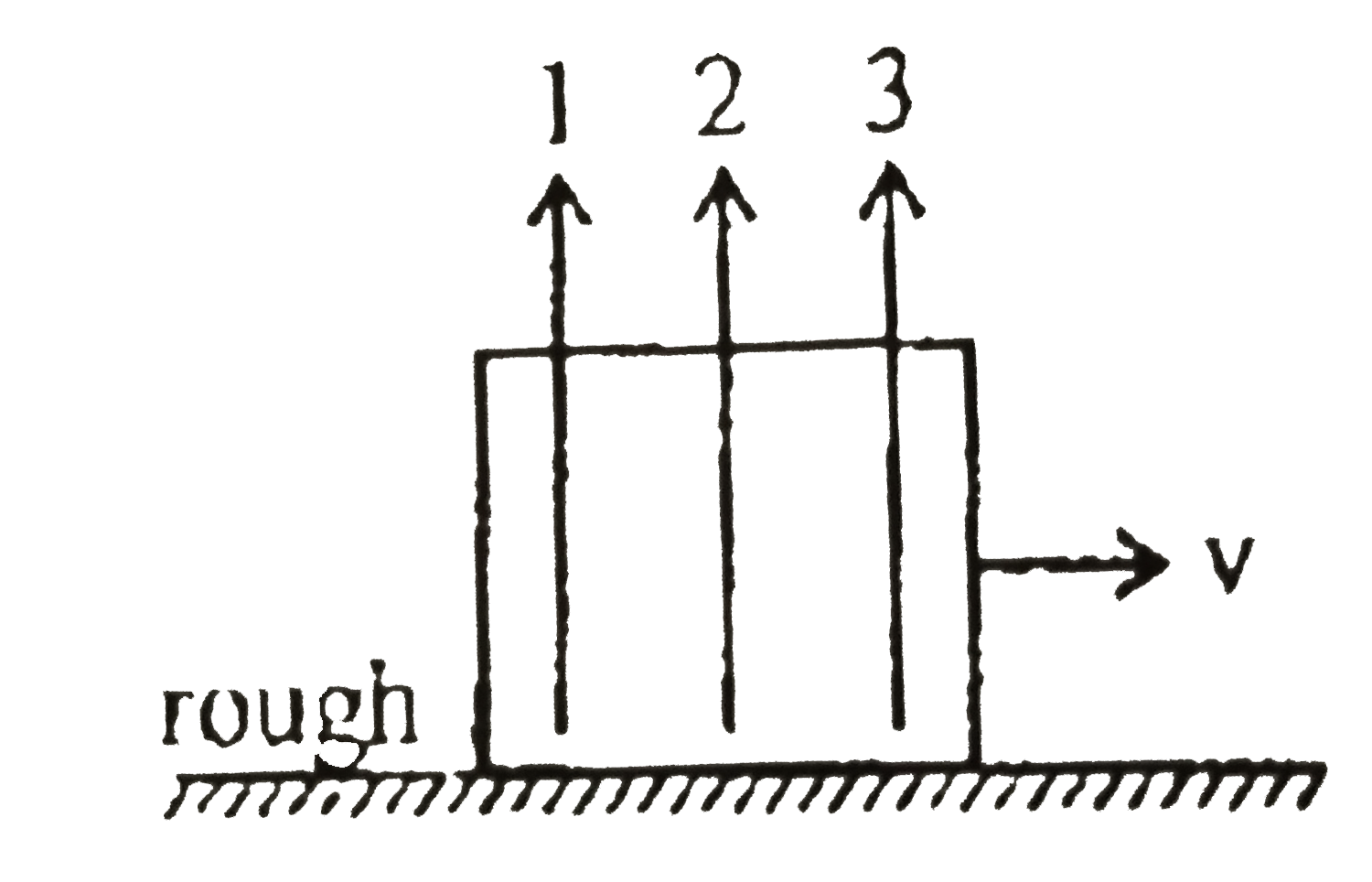A block of mass 100g slides on a rough horizontal surface .If the speed of the block decreases from 10ms−1→5ms−1, find the thermal energy developed in the processSolution in Tamil
The correct Answer is:C
Thermal energy developed =chan≥∈K.E.<br>= (1)/(2) xx (100)/(1000) xx 100- (1)/(2) xx (100)/(1000) xx 25<br>=5−(54)=154=3.75J
Topper's Solved these Questions
Similar Questions
The heat capacity of a body depends on
View SolutionThree particles of masses 1.0 kg 2.0 kg and 3.0 kg are placed at the corners A,B and C respectively of an equilateral triangle ABC of edge 1m. Locate the centre of mass of the system.
View SolutionTwo blocks of masses 10kgand20kg moving at speeds of 10ms−1and20ms−1 respectively in opposite direction approach each other and colide .If the collision is completely inelastic , find the thermal energy developed in the process
View SolutionA block of mass 10 kg slides down a rough slope which is inclined at 45^(0) to the horizontal. The coeffficient of sliding friction is 0.30 . When the block has to slide 5m , the work done on the block by the force of friction is nearly
View SolutionA copper block of mass 1kg slides down one rough inclined plane of inclination 37∘ at a constant speed. Find the increase in the temperature of the block as it slides down temperature of the block as it slides down through 60cm assuming that the loss in mechanical energy goes into the copper block as thermal energy. (specific heat of copper=420Jkg−1K−1,g=10ms−2)
View SolutionA block is kept on a rough horizontal surface. A variable horizontal force is acting on the block as shown in the figure. At t=0, block is at rest. Kinectic energy of block at t=5sec will be (g=10m/s2)

View SolutionA uniform cubical block is sliding on rough surface as shown. Find possible line of action of normal reaction acting on the block due to rough horizontal surface.

View SolutionA block of mass 20 kg is placed on a rough horizontal surface. When a force of 80 N is applied at an angle of 30°with the horizontal, the block just begins to slide. What is the coefficient of static friction ? (g= 10m//s^2 )
View SolutionA block of 100 g liquid is slipping on a rough horizontal surface. If the speed of the block drops from 10 m / s to 5m / s, the energy generated in this process will be
View SolutionA prism of mass M is placed on a horizontal surface. A block of mass m slides on the prism, which in tum slides on the horizontal surface. Assuming all surfaces to be frictionless, find the acceleration of block with respect to prism.

View SolutionTwo blocks of masses 10kg and 20kg moving at speeds of 10ms^(-1) and 20ms^(-1) respectively in opposite direction approach each other and collide .If the collision is completely inelastic , find the thermal energy developed in the process
View SolutionA copper cube of mass 200g slides down an a rough inclined plane of inclination 37∘ at a constant speed Assume that any loss in mechanical energy goes into the copper block as thermal energy .Find the increase in the temperature of the block as if slides down through 60cm Specific head capacity of copper =420Jkg−1K−1
View SolutionA prism of mass M is placed on a horizontal surface. A block of mass m slides on the prism, which in tum slides on the horizontal surface. Assuming all surfaces to be frictionless, find the acceleration of block with respect to prism.

View SolutionA block of mass 'm' moves on a horizontal rough surface with initial velocity 'v'. The height of the centre of mass of the block is 'h' from the surface. Consider a point 'A' on the surface of sliding
View SolutionA prism of mass M is placed on a horizontal surface . A block of mass m slides on the prism , which in turn slides on the horizontal surface . Assuming all surfaces to be frictionless find the acceleration of block with respect to prism .
View SolutionA copper cube of mass 200g slides down an a rough inclined plane of inclination 37∘ at a constant speed. Assume that any loss in mechanical energy goes into the copper block as thermal energy .Find the increase in the temperature of the block as it slides down through 60cm. Specific heat capacity of copper =420Jkg−1K−1
View Solution
